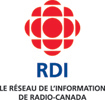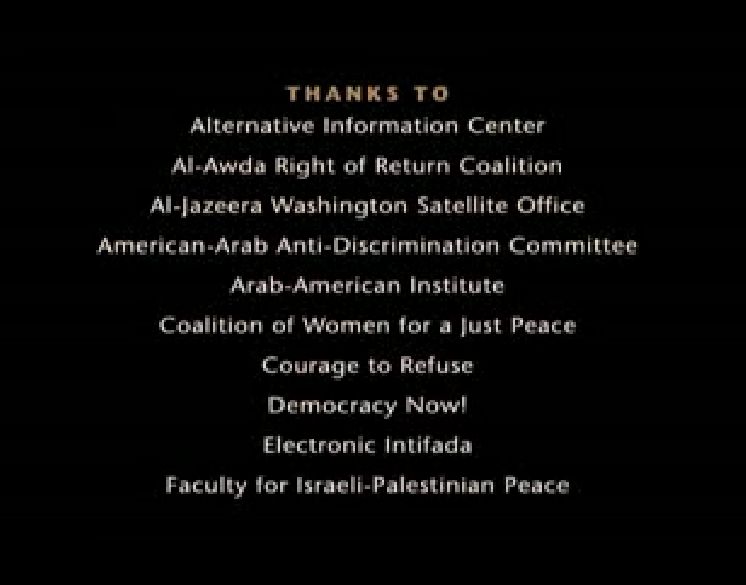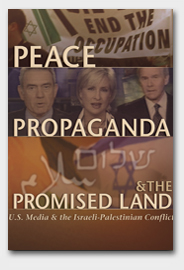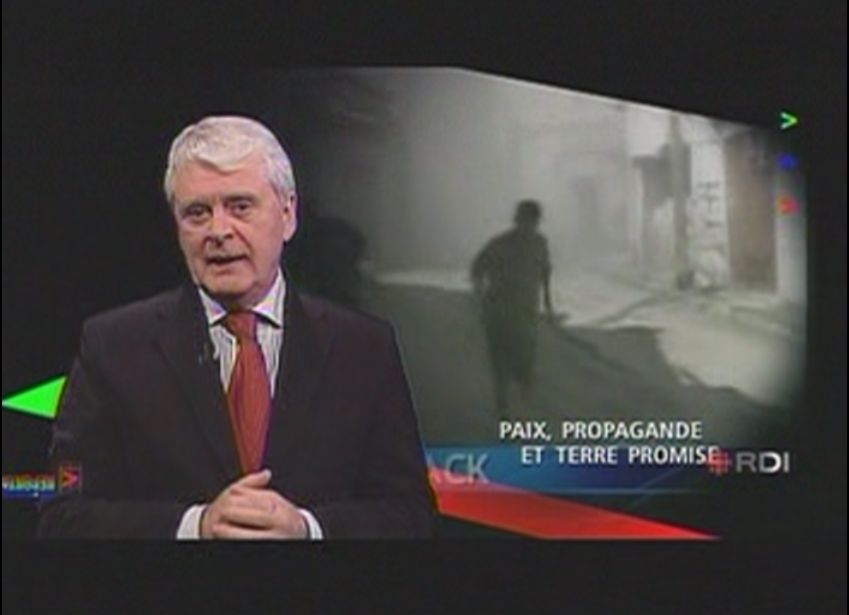
Radio-Canada Wrong In Airing Pro-Palestinian Advocacy Film
October 31, 2008
Dear HonestReporting Canada subscriber: On October 23,
Radio-Canada, the French arm of the CBC, aired the pro-Palestinian
advocacy film
"Peace, propaganda and the promised
land" on its documentary film program "Les grands
reportages". By airing a film rife with false premises, serious
omissions, and unfounded malicious allegations, the network not only
misinformed Canadians about the politics and history of the Middle
East, it also breached its own journalistic standards and
practices by airing a one-sided partisan polemic bent on vilifying a
fellow democracy, the state of Israel.
Introducing
the film, Radio-Canada host Simon Durivage's rhetorical questions
and leading opinions parroted the film's anti-Israel thesis. To view the introduction
click here or
on the image below.
On October 23,
Radio-Canada, the French arm of the CBC, aired the pro-Palestinian
advocacy film
"Peace, propaganda and the promised
land" on its documentary film program "Les grands
reportages". By airing a film rife with false premises, serious
omissions, and unfounded malicious allegations, the network not only
misinformed Canadians about the politics and history of the Middle
East, it also breached its own journalistic standards and
practices by airing a one-sided partisan polemic bent on vilifying a
fellow democracy, the state of Israel.
Introducing
the film, Radio-Canada host Simon Durivage's rhetorical questions
and leading opinions parroted the film's anti-Israel thesis. To view the introduction
click here or
on the image below.
(Note: HRC English translation appears below)
Durivage: "Peace, propaganda and the promised land. Do the American media view Israeli settlement of occupied territories as a defensive gesture only? ... According to Middle East experts, for forty years, the settlement policy of the Hebrew state has grown inside the occupied Palestinian territories. Result: daily violence on both the Palestinian and Israeli side. So what message do the American media convey regarding this interminable conflict? Do they distort the judgment of our southern neighbours?"
Ironically, it's Radio-Canada and Durivage who have distorted the judgment of Canadian viewers by presenting the Arab narrative as fact by exclusively blaming violence on Israeli settlements and ignoring all other possible causes for the conflict.
The film, which was produced in 2003/4 by the Media Education Foundation, an advocacy group whose mandate is to "answer the challenge posed by the radical and accelerating corporate threat to democracy" and whose board of advisors includes the likes of notorious anti-Israel activists like Noam Chomsky and Naomi Klein, claims to show "the foreign policy interests of American political elites - working in combination with Israeli public relations strategies - exercise a powerful influence over news reporting about the Middle East conflict."
To view the "documentary" in its entirety (80-minutes in length) please click here or on the image below. (Note: Radio-Canada aired an edited down and more condensed one-hour version of the film with French-language voice-overs)
A New York Times review of the film found that the "pro-Palestinian documentary attempts to prosecute Israel in the court of U.S. public opinion", while noting that the "documentary largely ignores Palestinian leadership, which has surely played a part in the conflict's broken vows and broken hearts. And such a lack of dispassion weakens the one-sided film's bold and detailed argument."
Likewise, a scholarly analysis of the film by Yitzhak Santis, the Director of Middle East Affairs for the Jewish Community Relations Council (JCRC) in 2004, noted that the film was full of "decontextualizations, disinformation, selective emphasis and blatant lies, lack of balancing perspectives, lack of citations/documentation to back up assertions of facts, omission of facts, and straw man argumentations." To read the full report online please click here.
Among its many flaws, the film presents quotes from radical anti-Israel activists presenting them as if they were objective commentators to the conflict, it shows a series of news reports out of context and without explanation, and makes blanket statements about Israeli/Jewish attempts to control the media which are baseless and without merit. Furthermore, the film virtually ignores terrorism against Israeli civilians and the very well known Palestinian intimidation of the press.
Santis' report
concludes by noting that "It should be incumbent upon public
television stations that hold the trust of its viewers to promote
"truth in packaging" by informing its audience that this is not an
objective study of media coverage of this conflict, but an advocacy
piece with a political agenda."
The film, which offered "special thanks" in its credits to pro-Palestinian organizations like: Electronic Intifadah, Al Awda, International Solidarity Movement, and the Arab American Anti-Discrimination Committee, was also dedicated in the memory of famous pro-Palestinian activist Edward Said.
At a bare minimum, Radio-Canada should have tested the program against the organization's guidelines for "point-of-view documentaries in the sense of advocacy". According to Radio-Canada's guidelines for Journalistic Standards and Practices:
"Great caution should be taken to protect the integrity of the Corporation's impartiality in information programming and its independence of special interest groups... In considering such works of opinion or argument for broadcast, the CBC (read Radio-Canada) has to assure fairness and balance by other means. The CBC should also guard against political or economic interest groups and lobbies exploiting this avenue."
Radio-Canada asks its own programmers to apply various tests when deciding whether or nor to feature a particular documentary. It asks programmers to ensure that "a production should be of particular excellence and pertinence in the eyes of the CBC", that the film "should be prominently identified as a work of opinion at the beginning and at the end", that the "CBC must be completely satisfied that this work is financed independently from any party having a direct interest in the issue", that facts should be "respected and arguments should reasonably flow from those facts... to ensure that the argument presented does not rest on false evidence", and finally that "the broadcast of a clearly partisan production from a single perspective obligates the CBC to provide an appropriate reflection of other pertinent points of view."
Using the
national broadcaster's own guidelines, the film can't be defined as
being of a "particular excellence" given its numerous errors and
misrepresentations and its clear nature as an advocacy piece for
pro-Palestinian propaganda purposes. Finally, as Radio-Canada has
failed to provide alternative perspectives, the network failed to
give "an appropriate reflection of other pertinent points of view"
as a counterbalance.
alternative perspectives, the network failed to
give "an appropriate reflection of other pertinent points of view"
as a counterbalance.
Tell Radio-Canada that its October 23 broadcast of "Peace, propaganda and the promised land" on "Les grands reportages" failed to inform its viewers that the film was not an objective study of media coverage of the Arab-Israeli conflict, but a pro-Palestinian advocacy tool with a political agenda, rife with errors and omissions that have seriously misled Canadians.
Ask Radio-Canada to apologize, to conduct a formal review, and to implement stricter quality control protocols to ensure that this doesn't happen again. Please send polite and rational emails to Radio-Canada Ombudsman Julie Miville-Dechene at ombudsman@radio-canada.ca or call (514) 597-4757 to voice your concerns.media coverage of Israel and the Middle East
